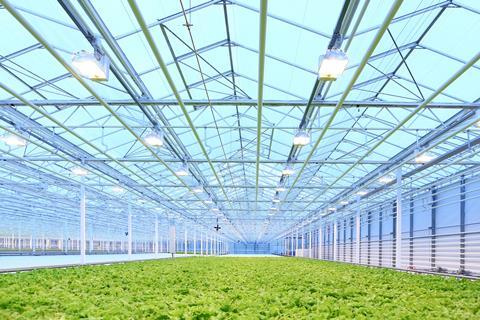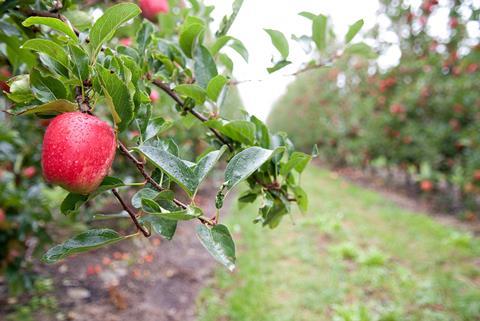Sector fighting for concerns to be heard that ending current funding for English and Welsh POs will see loss of vital innovation, threaten small growers, and create unlevel playing field across UK and Europe

“Gob-smacked” growers say they are facing a competitive disadvantage and the loss of vital research to drive the industry forward when the current funding for English and Welsh Producer Organisations (POs) comes to an end later this year.
The loss of funding will also remove a crucial source of funding for smaller growers who, as members of POs, are supported to invest in the sustainability of their businesses, in a threat to resilience and diversity across the entire fresh produce supply chain.
POs have been funded under the Fruit & Veg Aid Scheme since 1998, but as an EU-established payment system, it is being phased out post-Brexit in England and Wales. The Scottish and Northern Irish government have confirmed they will extend the funding for POs in their countries, while the EU is also continuing the scheme. This leaves English and Welsh POs competing with their European counterparts for shelf space without like-for-like funding.
POs will still be able to be established and will continue to be exempt from competition law, Defra confirmed to FPJ.
But the industry has criticised the government for removing what it sees as a cost-effective source of funding that contributes to key national goals around food security, biodiversity restoration and climate resilience.
The scheme currently costs the government £40 million a year, with POs able to apply for match-funded grants up to 4.1 per cent of the value of their marketable produce.
“My reaction is incredulous. I can’t believe the bean counters can’t work out the value they’re getting from what is very little money,” says Fen Peas managing director Stephen Francis. “It’s an eggcup-full of spending for the Treasury.”
A Defra spokesperson said it is “completely false” to claim POs are being scrapped, and said the government is “committed to simplifying competitive grant schemes”. “This government is committed to supporting the horticultural industry, including Producer Organisations. However, the Fruit & Vegetable Aid Scheme does not work as it supports just 20 per cent of the horticulture sector,” a spokesperson said.
What do POs get under current funding?
Examples of projects that have been funded through the scheme include biological controls for invasive fruit fly Spotted Wing Drosophila on berries, more efficient pea viners using less diesel, and reductions in chemicals and fertiliser usage in salads.
“Firstly, the context for this scheme was that it is match funding. It was never a subsidy. The Fruit and Veg Aid Scheme allowed Fen Peas to invest rapidly in our harvesters, because we had confidence and the funds partly underwrote the investment,” continues Francis. “We were using 20,000 litres of diesel in our old machines, which has been reduced down to 89,000 litres.
“Post Brexit, if this scheme ends, our costs will go up but also we won’t be able to invest in new tech. You have to rethink everything you do,” says Francis.
In protected glasshouse crops, PO funding has been used for energy and chemical reduction, as well as increases in production, quality and efficiency. “This has meant that we have invested in water recycling to reduce water and fertiliser usage; we have invested in more biological control to replace chemical usage,” says David Schellingerhout, managing director of Yorkshire salad veg producer and PO Glen Avon Growers.
“We have upgraded our grading equipment to improve quality and also increased the efficiency of the packhouse. Some members have installed thermal screens in their glasshouses to reduce energy usage,” he adds.

But these high capital innovations will now be made more difficult. Francis says a decision about a new harvester, which would cut diesel use again, is now 50:50.
And while losing the ability to innovate easily will be one downside, Schellingerhout says the real “sucker punch” has been the fact that Scottish and Northern Irish POs will continue to be supported.
“The part that has really upset us in the last few weeks is that both the Scottish government and the Northern Irish have announced that they are going to continue with the scheme,” he says.
“So, a business north of the border now has a competitive edge over one south of the border, and in this industry where margins are small how can that be fair?”
There are currently 32 POs in England, Wales, Scotland and Northern Ireland comprising around 1,000 separate businesses. Those businesses account for 43 per cent of UK-grown produce, covering soft fruit, topfruit, peas, mushrooms and protected salads.
Some, which were previously cooperatives, will continue to trade as POs but even the larger entities are rethinking what elements they will be able to fund going forwards.
Managing and sales director of Berry Gardens, Patrick Bastow, says the group, which has 30 members, has been able to use PO funding to work with a start-up trialling a biological control to the invasive fruit fly Spotted wing drosophila (SWD).
“It’s allowed our growers to trial that on a commercial scale. It’s world-class British technology,” says Bastow, who is also chair of the PO Steering Group, set up to coordinate an industry response.
Bastow says Berry Gardens “does a lot more than just grants”, but points to tricky decisions ahead. “We also fund early payments for growers and this will continue. We have a trial site, which may have to go.”
Loss of funding could lead to consolidation
At another large PO, G’s Growers, there is “no question that it will continue” but director Fay Colson points to fears for other smaller grower groups.
“POs look after small growers,” she says. “This is the key point. We have some small members and they’re protected because outside the PO structure, they won’t have a marketing desk and the risk is that these small growers will be out-tendered and eventually disappear,” says Colson, who believes there will be an impact on rural communities where small horticulture businesses provide numerous local jobs. “It’s a one-way street – if these growers pack up, they’ll have finished and sold up,” she adds.
“Ultimately it allows small and medium growers to supply into retailers,” says Bastow. “You need different sizes within a grower base for resilience. If a big grower goes bust, that’s a huge problem. It’s putting the resilience of the country at risk.”
“In the first one or two years, growers won’t mind. It will mean less to be spent on innovation. But as soon as you stop investing, after 10 years you lose your business,” he explains.
PO funding has helped some of G’s growers look at projects around peat reduction, cultivation and aerial imaging. Anthony Gardiner, director of communications for the wider G’s Group, says: “As a capital hungry business, it’s about where you place your money. It’s the more experimental innovation that will be lost. It’s things that may work, or may not work. If they do, it could be a revolution.
“The key is we need a level playing field. If we want to drive productivity, this was a good way of doing it.”
Competitive grants ‘don’t work for produce’
Although Colson says G’s is “ultimately bracing ourselves to get the funding through competitive grants”, a key criticism is that such grant schemes, like the recently re-opened Sustainable Farming Incentive (SFI), don’t work for produce.
“Due to their intensity of production and therefore relatively small land holdings, the SFI scheme was not widely taken up by growers in POs. Competitive grant schemes do not allow for strategic investments,” says Bastow.
A split within the produce industry
But not everyone within the produce sector agrees that POs should continue to be funded. “There is some negative noise from horticulture growers, ornamentals and potatoes,” says Colson, noting the sectors that aren’t eligible for the current scheme.
“You have to go through one marketing organisation and everyone is very precious about their branding. Defra could continue the scheme post Brexit but change the rules,” she explains.
And while some sectors are almost entirely traded through POs (93 per cent of the soft-fruit business), other larger suppliers – the likes of Dyson Farming and stonefruit supplier Mansfield – are not within the scheme.
As a result, trade bodies and unions that represent the full industry have their hands tied in how far they can help lobby on the issue. The NFU says it wants a wider scheme to encompass the whole sector. “As a matter of urgency, we are calling for the development of a new, expanded, more inclusive support scheme that benefits all growers, whether they are in a Producer Organisation or not,” says NFU horticulture and potatoes board chair, Martin Emmett.

Chief executive of British Growers Association (BGA), John Walgate, says the closure of the wider Fruit & Veg Aid Scheme comes at a “disappointing time, when we are starting to appreciate that we need to consume more fruit and vegetables for our health and that we need to reduce our reliance on imports.
“Supporting co-operatives is also part of the current government manifesto. The PO scheme indeed supported many smaller growers who may miss out on other competitive grants.”
A seat at the table
Growers within POs say they have struggled to get a hearing for their concerns. Partly because “it’s not sexy”, says Bastow, who said there had been no media interest until FPJ got in touch. “No one has heard of POs and no one wants to put up a fight for them,” he says.
“We’ve had two meetings with Defra before the election but nothing since. There’s been no follow up since the new government.”
With the PO Steering Group due to become an official association, there are hopes of a seat at the table to consult on how the scheme will come to a close.
“We want to get in a room with Defra, the NFU and the BGA to come up with a solution that works for everyone. As a steering group, we want to explore how to support horticulture outside of POs,” says Colson, who adds: “Ever since the election, it’s been wait for this, wait for that. It’s creating a void that we can’t afford.”
Defra told FPJ that the government is “fully supportive of the POs system and welcomes a stronger role for POs within horticulture”. “We are currently exploring how to best deliver the Prime Minister’s ambition to boost food security and horticulture’s important role in this.
“Defra ministers and officials meet regularly with a variety of growers from across the sector, including a number of POs members, to discuss a wide range of issues to help us understand how best to support the sector.”
But while increased communication may help avoid a cliff edge, in the long term, there is a question mark over how to replace a small but impactful funding pot that has gone further than expected in making crucial sustainability and productivity gains, within one of the sectors most vital for future food security and national health.
As Bastow puts it: “I’m really concerned about the massively short-term decision-making by people who don’t understand our industry and frankly aren’t listening.”



